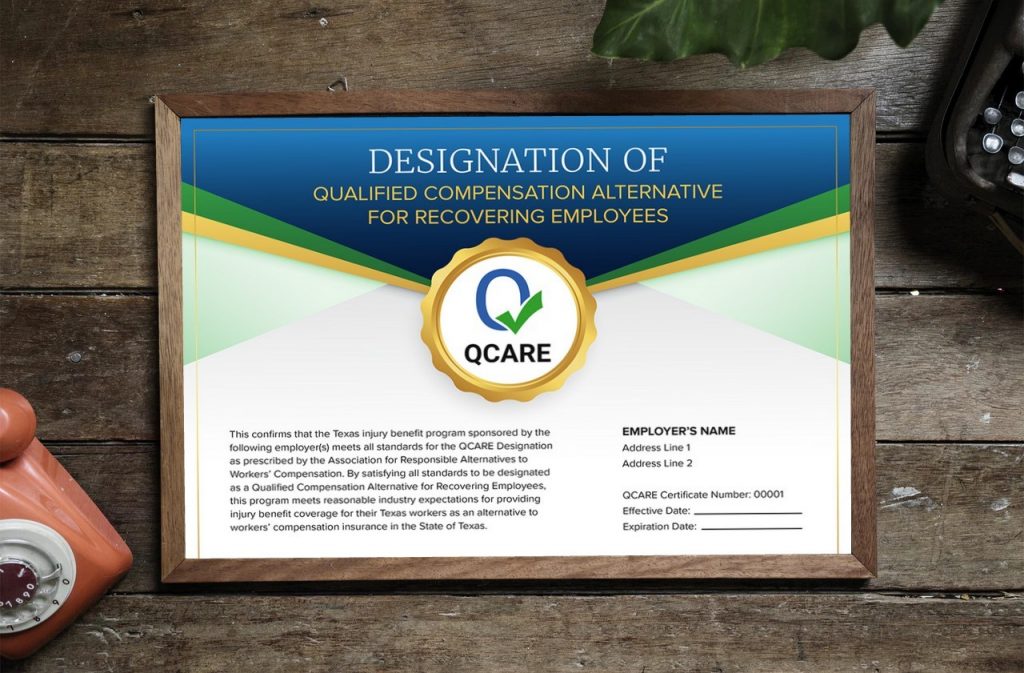Protecting the customer, their workers and YOU.
- A Competitive Alternative When Your Clients Need It. With the value-added QCARE seal of approval.
- High Commission Rates. Most QCARE-qualified insurance policies have higher commissions than workers’ compensation insurance.
- Fewer Difficult Claims and E&O Exposures. By supporting industry standards for injured worker care.
- Stay Up-to-Date. Join ARAWC for continuing education and the latest news, events, data and other information on Texas injury benefit programs.
What Does QCARE Achieve?
QCARE (Qualified Compensation Alternative for Recovering Employees) is a simple, no-cost, online designation to recognize employers with a responsible Texas injury benefit program that satisfies high industry standards.
Confidentiality of QCARE Applicant Information
ARAWC’s mission and the over-arching goal of QCARE are to protect and promote Texas injury benefit plans for the benefit of all ARAWC members. So, from inception, the QCARE program infrastructure was developed to address employer and insurance industry concerns regarding confidentiality. Those protections have been even further enhanced. Here’s a summary:
1. Not Seeking Any Confidential Information. ARAWC is NOT seeking to gather any insurance policy forms or endorsements, policy renewal dates, limits of coverage, premium-related information, claims information, or any other employer or program data.
2. Simple Application and Verification Procedures. The QCARE application is very simple and the employer (or its authorized representative) self-certifies to satisfaction of the 10 QCARE requirements. Basic employer contact information (email and phone) is requested solely to facilitate the verification that certain QCARE requirements have been met on a sampling of applications. For example, on every 15th QCARE application, a basic insurance coverage verification can be done through email or a phone call from the employer’s insurance agent.
3. Administrative Team. QCARE applicant information is received and protected within a small group (the “Administrative Team”) comprised of (A) three QCARE Committee members (currently, designated representatives from Big Lots, Sysco Foods and Walmart), (B) the Program Administrator (Virtual, Inc.), and (C) the QCARE webmaster (Real News PR). No insurance company or program manager, attorney, consultant, claims administrator, insurance broker, agent or other service provider is eligible to serve on this Administrative Team or receive any QCARE applicant information.
4. Confidentiality Agreements have been signed by each member of this small Administrative Team. Information from QCARE applicants can NOT be made available to other ARAWC members (even others within ARAWC leadership) or the public in any form or manner.
5. Information containment and destruction. Each member of the Administrative Team maintains secure systems, and has agreed to a policy for document retention and destruction within 30 days of a final decision on a QCARE application.
6. No database or solicitation. No database or similar aggregation of information submitted by employers or agents will be constructed or maintained, other than the Employer Registry and basic, publicly available contact information. The Employer Registry on the QCARE website provides only the names of employers that have voluntarily elected to put their names on that list. No information submitted can be used for solicitation of business.
Questions or comments on QCARE’s confidentiality protections can be sent to [email protected].

Q&A For Insurance Agents
That’s great. So getting the QCARE designation is super-simple and will require a few minutes. The advantages described below for the agent and insured make it worthwhile.
- For reputation management, local and national media have consistently tried to shame Texas employers that do not have workers’ compensation insurance. And in today’s political and PR environment, negative publicity can wipe out customer and employee support overnight. The QCARE designation is a smart risk management strategy that separates responsible (QCARE) Texas employers from the bad guys who provide no workers’ comp or injury benefit plan protection. Employees at those companies may be killed or maimed on the job on any given day. So, don’t wake up to newspaper headlines about a bad accident and fumble, trying to explain how your customer and agency are different, using words like “nonsubscriber” and “opt-out” that are negative and have no clear meaning. Now, one word defines what it means to be a Texas employer with a responsible injury benefit program: QCARE.
- Reducing negligence liability exposure. The QCARE designation also defangs plaintiff lawyers who often rant and rave in lawsuits about an employer that “has just opted out and doesn’t care about their employees”. QCARE demonstrates that your customer DOES care about employees and meets high industry standards for employers with no workers’ comp insurance. The QCARE designation won’t prevent a judge, jury, or arbitrator from finding your customer was negligent in causing a workplace injury. But the QCARE designation could have a big, positive impact on limiting damages awarded against the employer (and its insurer). QCARE is evidence that the employer is trying to do the right thing for injured workers.
These advantages apply to small, mid-size and large agencies and employers.
- Fewer difficult claims and E&O exposures. This simple, free process of getting the QCARE designation confirms that key components of a “responsible nonsubscriber program” have all been reviewed with the insured and are in place. This may be the best (and is certainly the easiest) E&O protection an agent can get when supporting nonsubscribers to Texas workers’ comp.
- Protect your accounts. Serving as an “authorized representative” to complete the QCARE application and obtain the QCARE designation is a valuable service to the insured. Agents that don’t take this simple step leave their accounts more vulnerable to full-service agents.
No. But agents and employers can join the Association for Responsible Alternatives to Workers’ Compensation (“A-Rock”) for a relatively small dues amount. If they want to keep up with and influence what’s happening in nonsubscription, and make sure Texas employers continue to have this right, joining ARAWC is another no-brainer.
You don’t have to. The insured’s name is already on this Texas Division of Workers’ Compensation “bad list”.
- Check that list and confirm compliance. From this main WC coverage verification page, you see this Non-Subscriber download file: Excel. If your customer’s name is not on this spreadsheet, then they have failed to file an annual Form DWC-5, as required by law and subject to significant penalties.
- Good companies on the “good list”. Being associated with these heavyweights on the QCARE Employer Registry can be a good thing for you and your customer.
- But if you don’t want your customer’s name on the QCARE Employer Registry, just click “No” to that question on the QCARE application. A few QCARE employers have already made that decision. They still get the QCARE designation to show customers, employees, and underwriters, and it can be used in defense of any litigation.
Other questions or comments about QCARE for Insurance Agents can be sent to [email protected].
